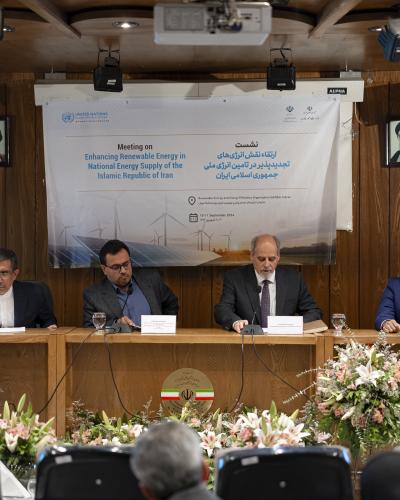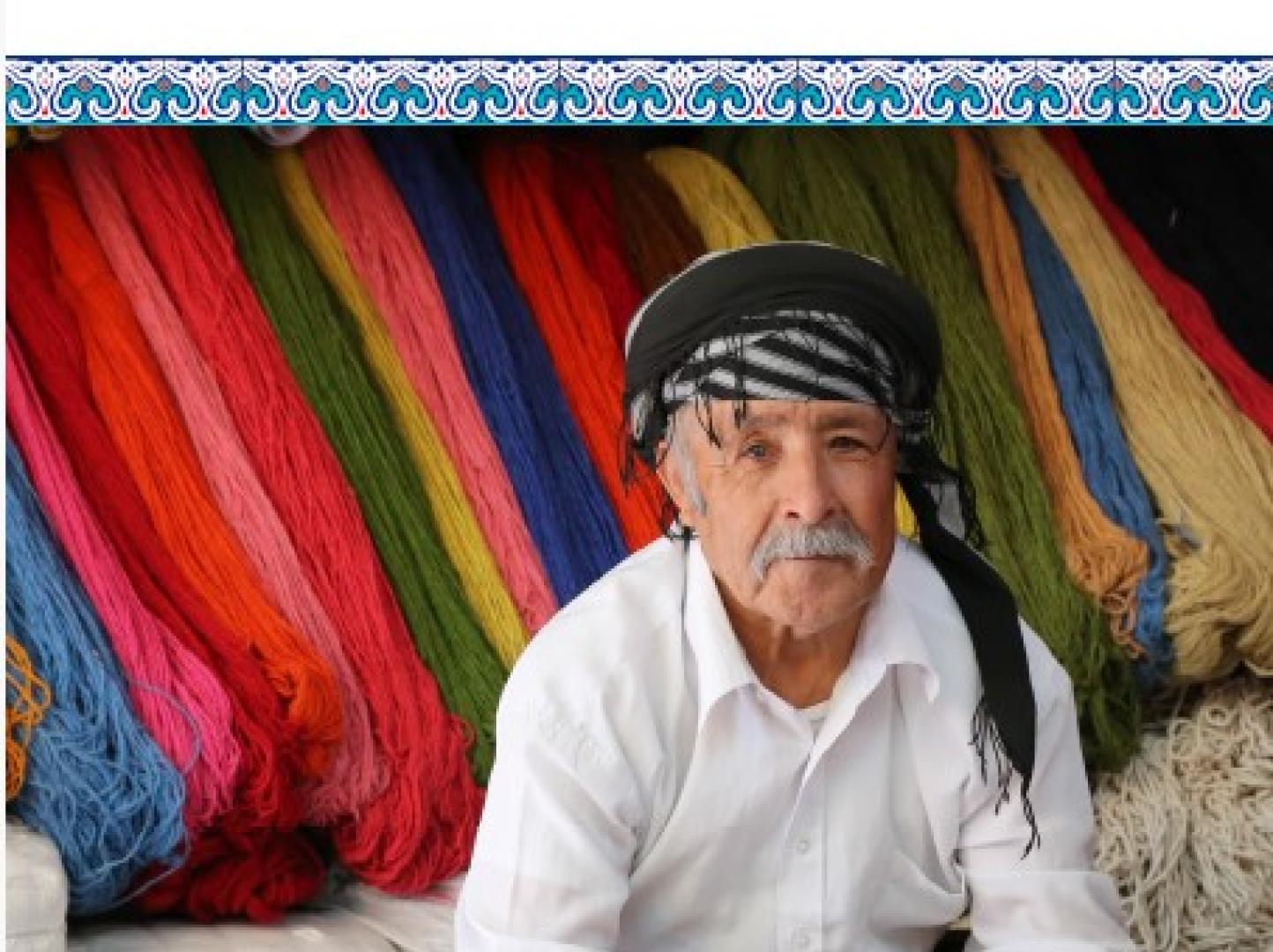Report of the Meeting on Enhancing the Role of Renewable Energy in National Energy Supply in the I.R. Iran

Introduction:
A multi-stakeholder meeting on “Enhancing the Role of Renewable Energy in National Energy Supply in the Islamic Republic of Iran" was convened from 10 to 11 September 2024, in Tehran, I. R. Iran. Organized by the Renewable Energy and Energy Efficiency Organization (SATBA) and supported by UN-Iran, and with the participation of the International Renewable Energy Agency (IRENA), UNDP Sustainable Energy Hub and UNIDO, the meeting focused on enhancing the role of renewable energy in Iran's energy mix promoting international cooperation, and exploring avenues for financing and technical and technological support.
During the discussions, it was highlighted that Renewable Energy represents an untapped economic opportunity for Iran. Achieving a sustainable energy future and reducing energy intensity domestically requires all-of-society and all-of-government action. The Islamic Republic of Iran possesses vast renewable energy potential, however it is faced with various external barriers and challenges to benefit from international cooperation to accelerate the deployment of renewable energy solutions.
The participants, while:
- Emphasizing on the need to enhance the share of renewable energy in the national energy supply for sustainable energy development,
- Acknowledging Iran's vast renewable energy potential and the critical importance of exploring new and cleaner energy resources
- Emphasizing and promoting the importance of international collaboration, financing, and capacity building to accelerate renewable energy development,
- Highlighting the need for mobilizing and enhancing financial, technical and technological support, through private sector engagement, and global partnerships among others to facilitate renewable energy expansion.
Agreed on the following:
- Iran has enormous Solar and wind resources and Pumped-Hydro Potential.
- Production of Renewable Energy sources, such as Solar and Wind Energy, are among the most available and emerging sources of renewable energy which together with smart policy making, could move national energy supply of countries towards an energy transition.
- The Government of I.R. Iran’s approach towards Renewable Energy can generate jobs and economic opportunities including in manufacturing, installation, and maintenance of renewable energy generation facilities. It would also encourage innovation in emerging technologies like energy storage, smart grids, and AI-driven energy management. Development of Renewable Energy can also facilitate diversification of economy, which allows for better economic resilience and cascading impact on environment and society.
- Complementing national financial mechanisms and private sector engagement to fund renewable energy initiatives, UN System agencies including UNDP can facilitate access to the international funds such as the GCF, GEF, as well as CIP and ETAF under the IRENA to generate and implement pilot projects in the Islamic Republic of Iran.
- In addition to promotion of renewable energy sources, using new technologies like AI in power generation, management and distribution together with smart power networks can help in deploying hybrid-combination of traditional and Renewable Energy during the transition. Therefore, in addition to financial support, international cooperation in knowledge transfer, technical assistance and data management also play crucial role in enhancing of the share of Renewable Energy in the energy supply.
- Emerging Renewable Energy sources such as green hydrogen, along with Market-based mechanisms and advanced financial models including Carbon Market, Debt-Energy Swap, Energy Savings Certificate, RE export, Blended Finance, Thematic Bonds, etc. were also discussed as possible means to facilitate renewable energy transition.
- Iran’s Green Trading Board and its Energy Exchange Market can be shared with other developing countries as a good practice.
And decided that the following points should be prioritized for joint action:
- Support the Development of Renewable Energy Projects and appreciate the commitment of national stakeholders to expand solar, wind, hydroelectric, geothermal, and biomass energy projects, aiming to achieve a renewable energy capacity of 30,000 MW by 2030.
- Support implementation of National Renewable Energy Policies which prioritizes renewable energy development by conducting policy reforms, enhance incentives, and foster an enabling environment for private sector investment.
- Urge IRENA and relevant UN agencies such as UNDP and UNIDO, to enhance their collaboration and support to SATBA to mobilize international financing and technical cooperation for renewable energy projects in Iran.
- Promote International Cooperation and Financing: Encourage international organizations, development banks, and global financial institutions to ease access and to provide financial and technical support to Iran’s renewable energy sector through various mechanisms.
- Welcome the initiative of the Government of I.R. Iran to prioritize renewable energy forms within national development strategies, recognizing their role in ensuring long-term energy security and environmental sustainability.
- Support Non-Governmental Stakeholders: Welcome the Iranian government’s plan to provide greater support for non-governmental stakeholders, including private sector entities, Banks, NGOs, Academia and research institutions, in the promotion and development of renewable energy technologies and projects.
- Expand Capacity Building and Knowledge Transfer: Call for the UN system to mobilize support for Iran in development of training programs and knowledge transfer initiatives aimed at improving technical and managerial capacities in renewable energy, with a focus on innovation, efficiency, and sustainability.
- Encourage Public-Private Partnerships (PPPs): Promote public-private partnerships to accelerate the development of renewable energy infrastructure, emphasizing collaborative efforts between the government, private sector, and international investors. Strengthening national regulatory reforms and incentives for local investors, would allow Iran to harness its internal resources for renewable energy development,
- Welcome the initiative of SATBA on preparation of a Roadmap for Energy Transition Readiness Assessment and other international efforts related to the development of Renewable Energy and Energy efficiency in Iran in collaboration with the UN system and IRENA to scale up renewable energy deployment.
- Reaffirm the importance of support by international financing institutions through establishment of transparent arrangements and modalities for extension of support in the form of grants, concessional loans, green trading and other investments to ensure that renewable energy projects are adequately supported and incentivized. Urge the UN system to promote collaboration with and among international institutions including intergovernmental organizations, Multilateral funds and development banks as well as universities and research bodies.
- Support Iran’s renewable energy development initiative, to ensure access to affordable, reliable, and sustainable energy for all.
- Support launch of robust financial mechanisms such as green bonds, renewable energy funds, and public-private partnerships in Iran. Takes note of Iran’s further initiativesto contribute to tripling renewable power capacity and doubling energy efficiency by 2030, while advancing infrastructure investment and regulatory frameworks to facilitate these ambitious targets which could contribute to sustainable energy supply as well as long-term environmental and social benefits.






